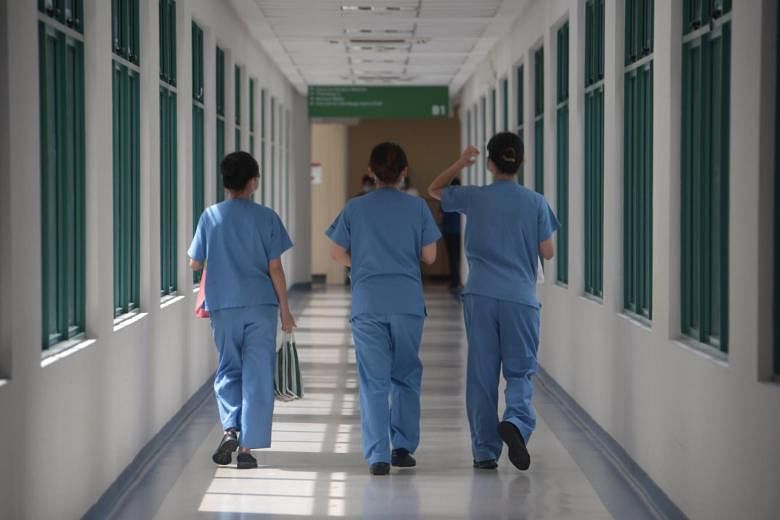SINGAPORE - The Muslim community here welcomes the likely change in stance on nurses wearing the tudung at work, Singapore's Mufti, the highest Islamic authority, has said.
In a letter to Prime Minister Lee Hsien Loong, Mufti Nazirudin Mohd Nasir said the Muslim community knows this is a complex decision with difficult and competing considerations, and expressed his hope that Muslim nurses will find comfort in this news.
In response, Mr Lee thanked Dr Nazirudin and the Islamic Religious Council of Singapore (Muis) for their support of the Government's deliberations on allowing nurses here to wear the tudung, or headscarf.
In a letter on Wednesday (March 31), Mr Lee said the Government fully appreciates the growing socio-religious significance of the tudung to Muslim Singaporeans, and that it is currently considering how this can be done.
The Prime Minister's Office on Wednesday released both Mr Lee's letter, as well as Dr Nazirudin's, which was sent on March 27.
Singapore has reached a delicate balance for racial and religious harmony, and Mr Lee said this has been achieved by treating everyone equally without prejudice and discrimination, and by building a national identity shared by all communities while allowing each to practise their faith and way of life.
"But this balance is dynamic. As younger generations of Singaporeans grow up and attitudes change, new issues and pressures arise. These must be addressed, taking into account Singapore's context," said Mr Lee.
"Any change we make must be carefully considered and gradual. Only thus will the changes be understood and accepted by all communities, and the outcomes reinforce rather than weaken our racial and religious harmony."
This exchange comes after Home Affairs and Law Minister K. Shanmugam disclosed during a dialogue with senior Muslim leaders last Tuesday that the Government is considering allowing nurses to wear the tudung at work, a point he said he had made at a similar dialogue with the leaders last August.
Mr Shanmugam had said that Mr Lee will meet Muslim community leaders, and that discussions will take a few more months, after which a decision would be announced.
His comments came two weeks after remarks in Parliament by two Malay/Muslim ministers on the subject sparked a critical reaction among segments of the community, even as they said they empathised with nurses who wish to wear the tudung at work.
Minister-in-charge of Muslim Affairs Masagos Zulkilfi and Minister in the Prime Minister's Office Maliki Osman had told the House that Singapore's approach to dealing with sensitive issues like the wearing of the tudung in certain professions is to discuss them behind closed doors, as open discussion may lead to serious ramifications and have an impact on religious harmony.
In his letter, Dr Nazirudin told Mr Lee that the Muslim community here appreciates that the decision of allowing nurses to wear the tudung at the workplace is a complex one "with many difficult and competing considerations".
"In our multi-religious society, it is indeed not easy to manage different aspirations and expectations and maintain a high level of trust and confidence between communities at the same time," he said.
"We fully support the Government's secular and neutral stance in treating various religious groups evenly, while it consults the community and considers the impact of its policies on society."
He also said that Muis is deeply appreciative of the opportunities to provide feedback and inputs on many national issues, including on the tudung, and noted that many state policies here have carefully considered and supported the needs of the Muslim community.
While it might have specific religious needs, the community strongly believes that its religious principles and values underscore the importance of good citizenry, said Dr Nazirudin.
This, he added, was exemplified over the last year, when religious leaders guided the community to make difficult adjustments as part of ensuring everyone's safety and helping the nation recover from the pandemic.
Mr Lee thanked Dr Nazirudin and Muis for helping to build Singapore's racial and religious harmony, which the Republic has enjoyed for more than half a century.
He also held up how Muis has stepped up on many occasions to lead interfaith efforts and strengthen the bonds of trust between Muslims and other religious communities in Singapore.
"I look forward to working with Muis to strengthen social cohesion, and achieve progress for the Muslim community and all Singaporeans," said Mr Lee.


